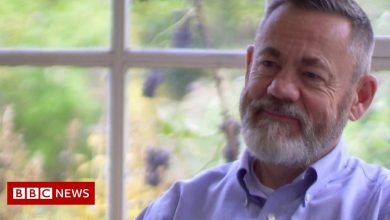First perspective: ‘Simple dream’ of the Syrian people after the earthquake

Shirin Yaseen from Office of the Spokesperson of the Secretary-General of the United Nations visited northwestern Syria as part of an interagency mission to assess the situation there.
“On the day we visited Jindairis in northern Syria, one of the areas hardest hit by the February earthquake, the weather conditions were very bad. A mobile medical clinic housed in a tent was blown off the ground by high winds.

Girls play at a reception center for evacuees in Jindairis, Aleppo province.
The dreams of the kids in this camp were simple. One told me she needed glasses, another decent pair of shoes so she could walk the camp’s unpaved roads. A young girl, Ahlam, told me that all she wanted was to go back to school. A mother asks for a wheelchair for her 20-year-old daughter.
earthquake experience
In another camp, in Idleb, named Kammonah, I met Yazi Khaled Al-Abdullah, whose suffering reflects the experience of hundreds of thousands of people who were left homeless as a result of the earthquake.
She told me that at four in the morning she felt shaky but didn’t know what was going on. Her children told her not to be afraid and after they all left the house, the house fell apart. It was raining and they were shivering from the cold, but didn’t know what to do and where to go.

Yazi Khaled Al-Abdullah lived in a tent after the earthquake.
They eventually arrived at the Kammonah camp and were advised to sign up for a shelter. A month after the earthquake, they were still living in tents with two other families.
Yazi Khaled Al-Abdullah told me that she likes to cook but doesn’t have a pot or a gas stove. Sometimes prepared food, usually rice, is provided, but she has diabetes so she is not getting the nutrients she needs.
She and her family desperately want to return home even if it means living a very basic life. She used an Arabic idiom saying that even if they only have land to eat, they still want to return to their homeland.
Her family left Sinjar eight years ago because of the war in Syria and spent time traveling. She told me that her son and husband were farming and tending sheep when they were killed by the plane. In her words, they became martyrs.
I also met Mazyad Abdul Majeed Al-Zayed, who runs the Ajnadayn camp in Jindairis and is himself a victim of the earthquake.
He explained the difficult conditions the campers lived in, due to the lack of everything, including tents. Mobile clinics operate in the area but lack drugs and come only sporadically.

Mazyad Abdel-Majeed Al-Zayed, manager of the Ajnadayn camp in Jindairis.
He said the camp was miserable and he didn’t bring his family here because he couldn’t bear to see them live in such conditions.
Then I visited the tents set up opposite the Al-Rafa Specialty Hospital in Jindairis, where there are mobile clinics, including one for children and one for women.
Patients and visitors are welcomed daily at these clinics, which were established a few days after the earthquake.
The hospital is surrounded by destroyed buildings, and the medical staff live and work in conditions similar to those they are treating.
The medical system in this part of Syria was already overwhelmed even before the earthquake, and now the medical staff is exhausted and the equipment is almost completely broken.
Countless people affected by the earthquake have sought refuge in this area in northwestern Syria. Many have done so to escape the war that has raged for 12 years.

The United Nations has launched a $400 million humanitarian appeal to assist displaced families.
One woman I spoke to said she had no idea what her future would hold having been on the run for five years from Saraqib to bombed-out Afrin, then to Jindairis.
I have met and talked to a lot of people, including orphans, children who have been turned upside down by war and then earthquakes.
But I also meet people who are hopeful and optimistic about a brighter future. I have met diligent and caring aid workers who work with the UN and who are working every day to improve the lives of those affected.
Meanwhile, the United Nations issued a Humanitarian appeal $400 millionand continue to work with our partners to ensure relief supplies reach the most vulnerable.
Find more This on UN work in Syria.




